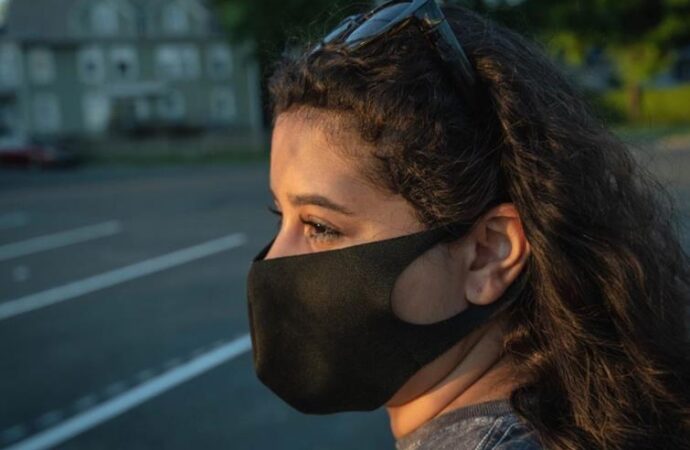“Gloom, despair, and agony on me,
Deep dark depression, excessive misery….”
Those were the opening lines to a song based skit from the country music and comedy show “Hee Haw” back in the 1970s. Somehow the words and tune have remained stuck in my mind all these years.
Those lines sum up my feelings regarding COVID-19 masks, distancing, and lockdowns. But only recently have I realized there may be a silver lining contained in such feelings.
For over a year now, I’ve felt gloom and despair going to my local grocery store. Some readers may find it strange, but I enjoyed grocery shopping before the pandemic. I live alone, and shopping meant seeing other people. I liked wandering the store’s aisles, nodding hello to other shoppers, crossing items off my list, and looking here and there for bargains.
Then came the masks, social-distancing signs, and floor markers, the “Great Toilet Paper Shortage,” and ravaged or half-emptied shelves, and my enjoyment went down the tubes. Ever since, when I put a mask on upon entering the store, a black cloud of unhappiness envelops me.
The library where I used to read and write brings the same reaction. After months of curbside service only, the library finally opened its doors to the public, but masks were required. I wear glasses and so I couldn’t see the print through the fog. Returned books were placed under a five-day quarantine, and the tables and chairs in the vestibule that I so enjoyed were removed. At least the library still lets patrons sit down. When I recently visited Asheville, North Carolina, the libraries there had removed all tables and chairs except for those at the computer workstations.
I was overjoyed when customers were finally allowed into the seating area of the coffee shop, but to this day customers must still pull up their masks on entering, and the baristas sanitize the tables between customers.
When I look at these measures, some of them now seem crazy, such as the mad rush for toilet paper last spring, or the library “quarantining” books, a process now reduced to three days. When it comes to masks, I can’t help wondering why I still see people wearing them while driving alone in cars, or why young people in their mid-20s or younger walk around downtown Front Royal in masks in 50-degree temperatures and a 10-mile an hour wind. Why at the coffee shop must we wear masks when ordering, but we can then sit at a table only 15 feet away and talk, type, or read for two hours without a face covering?
In essence, the last year of pandemic has taken its toll on me, and even now whenever I put on a mask, read the social distancing signs in these establishments, or listen to reminders on the radio to be safe, I become depressed or angry.
But here’s the strange thing. This past week I finally decided this reaction is healthy and good, a realization that in turn helped me feel better and more positive.
Let me explain.
If sometime in the past year I had simply woken up one morning, shrugged, and accepted all these restrictions as normal, or even justified, then my acceptance would have meant my surrender. I would have given up. The mask would have become my new norm, and distancing, quarantining books, and sanitizing tables would no longer irritate me, they would instead be mundane acts of everyday life.
So I’ve finally realized my rage and my irritation with these measures means I have not yet given up on common sense or my principles. I still think, and I suspect I will always think, that what we have allowed this pandemic to do to our economy, to the education and health of our young people, to our political system, and to our very humanity far outweighs the number of lives saved by our unique precautions. Readers may disagree, but that is the way I see things.
As for those I see who drive alone masked in their cars, who walk along a sidewalk with their six-year-old wearing a face covering, or who congratulate themselves on Facebook for getting the vaccine—good for you. I mean it.
But please know that, in my mind, many of the rules enacted in the last year strike me as unbalanced, wrong-headed, and more than a trifle nuts. I’ve generally obeyed those measures because in my state they are mandates and because I don’t want to distress my acquaintances at the coffee shop or library.
The mess of this past year—the riots, the presidential election, Joe Biden’s blizzard of executive orders, and all the rest—simply added to my black moods. Again, however, I realize this indicates that I haven’t yet succumbed to the madness.
Marcus Aurelius once wrote, “The object of life is not to be on the side of the majority, but to escape finding oneself in the ranks of the insane.”
That’s the goal.
—
Dear Readers,
Big Tech is suppressing our reach, refusing to let us advertise and squelching our ability to serve up a steady diet of truth and ideas. Help us fight back by becoming a member for just $5 a month and then join the discussion on Parler @CharlemagneInstitute and Gab @CharlemagneInstitute!
Image Credit:
Stocksnap, Public Domain
















Leave a Comment
Your email address will not be published. Required fields are marked with *